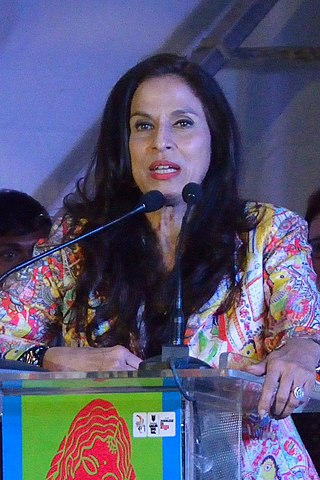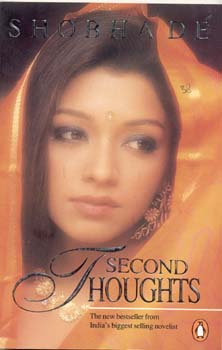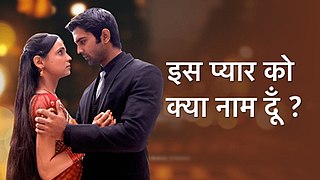
The Mysterious Affair at Styles is the first detective novel by British writer Agatha Christie, introducing her fictional detective Hercule Poirot. It was written in the middle of the First World War, in 1916, and first published by John Lane in the United States in October 1920 and in the United Kingdom by The Bodley Head on 21 January 1921.

Shakuntala Devi was an Indian mental calculator and writer, popularly known as the "Human Computer". Her talent earned her a place in the 1982 edition of The Guinness Book of World Records. However, the certificate for the record was given posthumously on 30 July 2020, despite Devi achieving her world record on 18 June 1980 at Imperial College, London. Devi was a precocious child and she demonstrated her arithmetic abilities at the University of Mysore without any formal education.

Love in the Time of Cholera is a novel written in Spanish by Colombian Nobel Prize-winning author Gabriel García Márquez and published in 1985. Edith Grossman's English translation was published by Alfred A. Knopf in 1988.
Anita Desai, born Anita Mazumdar, is an Indian novelist and the Emerita John E. Burchard Professor of Humanities at the Massachusetts Institute of Technology. As a writer she has been shortlisted for the Booker Prize three times. She received a Sahitya Akademi Award in 1978 for her novel Fire on the Mountain, from the Sahitya Akademi, India's National Academy of Letters. She won the British Guardian Prize for The Village by the Sea (1983). Her other works include The Peacock, Voices in the City, Fire on the Mountain and an anthology of short stories, Games at Twilight. She is on the advisory board of the Lalit Kala Akademi and a Fellow of the Royal Society of Literature, London.

Silsila (transl. Continuation) is a 1981 Indian Hindi-language romantic drama film co-written, directed, and produced by Yash Chopra. The story revolves around the love triangle of Amit, a romantic playwright, Shobha, his wife, and Chandni (Rekha), his former partner. Silsila follows the incidents faced by Amit and Shobha in their marriage of sacrifice and Amit's extramarital affair with Chandni. The soundtrack was composed by Shiv–Hari, with lyrics from Javed Akhtar, Hasan Kamal, Meera Dev Burman, Nida Fazli, Rajendra Krishan, and Harivansh Rai Bachchan.

Shobha De is an Indian novelist and columnist. She is best known for her depiction of socialites and sex in her works of fiction, for which she has been referred to as the "Jackie Collins of India."

Bewafaa (transl. Unfaithful) is a 2005 Indian musical romantic drama film starring Akshay Kumar, Anil Kapoor, Kareena Kapoor, Manoj Bajpayee, Sushmita Sen, Shamita Shetty and Kabir Bedi. The film is directed by Dharmesh Darshan, produced by Boney Kapoor and the music was composed by Nadeem–Shravan.

The Dark Room is a novel written by R.K.Narayan, the well-known English-language novelist from India. Like most of his other works, this is a tale set in the fictitious town of Malgudi.
Jean Catherine Coulter is an American author of romantic suspense thrillers and historical romances who currently resides in northern California.

Starry Nights is Shobha De's second novel. It is said that the novels' characters, Aasha Rani and her lover Akshay, were based on the real life love-affairs of Amitabh Bachchan with Rekha Ganesan and Dharmendra Singh Deol with Hema Malini. It was a best seller in India and cemented its authors reputation as being a provocative and daring author.

Second Thoughts is a novel by Shobhaa De.

Geeta Kapur is a noted Indian art critic, art historian and curator based in New Delhi. She was one of the pioneers of critical art writing in India, and who, as Indian Express noted, has "dominated the field of Indian contemporary art theory for three decades now". Her writings include artists' monographs, exhibition catalogues, books, and sets of widely anthologized essays on art, film, and cultural theory.

Sasural Simar Ka is an Indian Hindi-language television soap opera produced by Rashmi Sharma Telefilms that aired from 25 April 2011 to 2 March 2018 on Colors TV. It starred Dipika Kakar, Avika Gor, Dheeraj Dhoopar, Shoaib Ibrahim, Manish Raisinghan, Vaishali Takkar, Varun Sharma and Rohan Mehra. It is the second longest-running Indian television series on Colors TV after Balika Vadhu, which also featured Avika Gor.

Iss Pyaar Ko Kya Naam Doon? is an Indian Hindi-language romantic drama television series that aired on Star Plus from 6 June 2011 to 30 November 2012. Produced by Gul Khan under 4 Lions Films, it starred Barun Sobti and Sanaya Irani.

Phoolon Ki Sej is a 1964 Indian Hindi-language social film written and directed by Inder Raj Anand. It stars Ashok Kumar, Manoj Kumar, Vyjayanthimala in lead roles, along with Nirupa Roy, Lalita Pawar, Mehmood, Shubha Khote, Mukri, Kanhaiyalal in supporting roles. Music by Adi Narayana Rao is featured, including the song "Aa Bhi Ja Rasiya". The movie was based on Gulshan Nanda's novel of the same name. The film was produced by Anjali Pictures, the production company owned by actress Anjali Devi and husband P. Adinarayana Rao. Phoolon Ki Sej is about a love between Nirmal Verma and Karuna.
Bhaage Re Mann is an Indian soap opera which aired on Zindagi from 30 November 2015 to 25 July 2016. It was the first original soap of Zindagi. The story revolves around Padmini Awasthi.
Shobha Deepak Singh is an Indian cultural impresario, photographer, writer, classical dancer and the director of Shriram Bharatiya Kala Kendra, a Delhi-based cultural organization which promotes music and performing arts, through its schools and stage shows. She is known for her contributions for the revival of Mayurbhanj Chhau, a tribal martial dance form from Odisha. The Government of India awarded her the fourth highest civilian award of the Padma Shri in 1999, for her contributions to Arts and culture.

Zindagi Ki Mehak is an Indian drama television series which premiered on 19 September 2016 on Zee TV. It replaced Tashan-e-Ishq in its timeslot. After completing its run, it was replaced by Guddan Tumse Na Ho Payega in its timeslot. Produced by Parin Media, it starred Samiksha Jaiswal and Karan Vohra.

Qayamat Ki Raat is an Indian supernatural drama television series aired on Star Plus. It premiered on 23 June 2018. The series was co-produced by Ekta Kapoor and Shobha Kapoor under Balaji Telefilms. The show stars Karishma Tanna, Vivek Dahiya, Nirbhay Wadhwa, Saurish Singh Athwal and Madhurima Tuli.

Shobha Nehru, commonly known as Fori Nehru and Auntie Fori, was a Hungarian-born Indian social worker and the wife of the Indian civil servant Braj Kumar Nehru of the Nehru family.
















